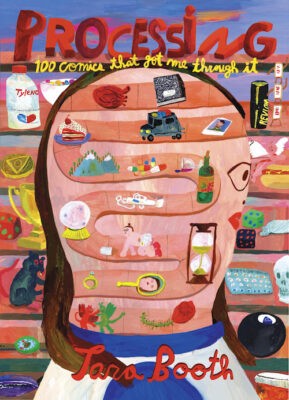Tara Booth’s Processing: 100 Comics That Got Me Through It is doing the work. The subhead is apt; this thick, densely illustrated tome hits somewhere between art book, autobiography, self-help journal, and comic, and Booth’s unique swirl of vivid colours, wryly embodied humour, and self-deprecating sincerity feel fresh and lively.

Processing
100 Comics That Got Me Through It
Tara Booth
Drawn & Quarterly
$34.95
paper
396pp
9781770467323
Her messy drawing style resists easy interpretation, much like the version of herself she presents with it. That’s no accident – her style extends and expresses her patterns of thinking and feeling, rooting her work in the affects that flood and saturate the events she depicts.
In one sequence, she meditates on the distortions of subjective recall post breakup, reflecting that “any memories of tenderness are warped so quickly and dissipate into nothing.” She paces this observation graphically in four moments: the first panel shows a crisp, specific recollection of affection, which fragments into unreadable waves in the second, dissolving into a tinted wash in the third, before vanishing into nothing at all by the end.
Both Booth’s style and the way she depicts herself with it feel defiant in the blandly attractive age of Instagram, when it’s never been easier to self-edit and buff away rough edges and minor flaws. Her work feels like a refusal to self-present beautifully. She paints herself as excessively ugly, with clumsy facial features and a stretched and swollen body. Her petty embarrassments and little lies and dirty mind are amplified on the page by loud colours and abrasive patterns; she takes more care with details in her depictions of T-shirt motifs than to the scale and physics of the world around her. Call it emotional realism; for Booth, her outsized feelings are the only story that really matters.
Throughout the book, she interposes graphic gaps between her short narratives, filling them with serial repeating motifs – they look and feel a little like emotional wallpaper, the background vibe between her more episodic comics about sex, her body, and self-discovery. Some are exuberant eruptions of riotous hues, where pages are filled with masses of wildflowers or butterflies in a punchy palette that underlines her turn to nature for psychological soothing. Others show echoic renderings of Booth herself, again and again, feeling her feelings on a background that’s disconsolately blurry and washed out, wallowing in a miasma of what she calls “psychic pollution.”
Much of Processing feels like therapy, and Booth takes us with her on the journey. We see her reading Ram Dass and bell hooks and The Women Who Run with the Wolves, and she talks us through some of her self-diagnoses. She brings us to therapy and foreplay, through breakups and into sobriety. We’re with her for restorative nature hikes with her dogs, and in the depths of a fit of depression. Throughout, her vulnerability is tempered by brash humour – because ultimately, Booth is funny – so much so that it’d be easy to miss that Processing is essentially a bildungsroman.
The last strips of Processing follow Booth into early recovery, though she isn’t the kind of storyteller to leave us with a pat ending. She’s still prone to what she calls the “emotional rat wheel,” where stray thoughts and obsessions become reality, but her tone softens, becomes gentler, as her self-deprecating humour offers a path to self-acceptance.mRb






0 Comments